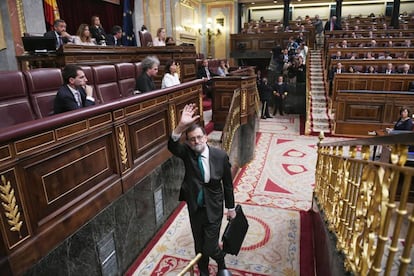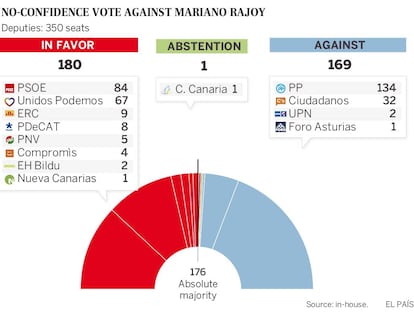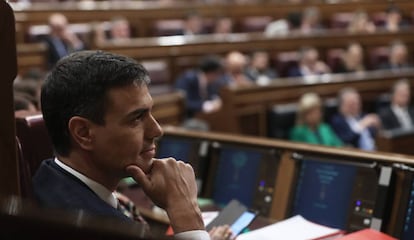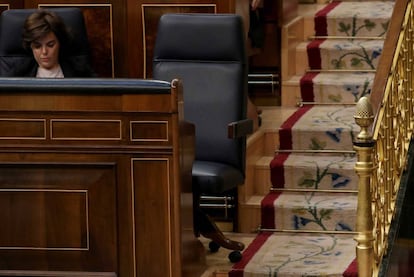Support of key Basque party paves way for Spain’s PM to be voted out of office
The Catalan separatists of PDeCAT have also pledged to support the Socialist Party motion to oust Mariano Rajoy from office, which could happen in a ballot tomorrow

Barring any last-minute changes, the no-confidence motion against Spanish Prime Minister Mariano Rajoy debated in Congress today will pass on Friday with 180 “yes” votes, four more than the 176 required for an absolute majority. Rajoy will be removed from office unless he decides to step down before the ballot takes place on Friday.
It will be the first successful no-confidence vote in Spain’s democratic history. Rajoy, 63, survived a no-confidence vote filed by Podemos in June of last year.
The Popular Party (PP) conservatives are facing the prospect of seeing their leader voted out of office as the result of a motion tabled last week by the main opposition Socialist Party (PSOE).

Rajoy on Thursday refused to step down ahead of the vote, as opposition leader Pedro Sánchez has urged him to do.
“Why should I have to resign, if for now I still have the trust of the house, and the trust awarded to me at the ballot boxes? You’re the one who should be resigning around here,” said Rajoy, who did not return to the chamber for the second part of today’s debate following the lunch recess.

Later on Thursday afternoon, sources from La Moncloa prime ministerial palace repeated assurances that the PM would not be stepping down.
If the vote prospers on Friday, Rajoy will be replaced by Socialist Party leader Pedro Sánchez. In a highly fragmented parliament where the PSOE only holds 84 seats, the success of the vote hinges on smaller regional parties such as the Basque Nationalist Party (PNV). On Thursday afternoon, PNV leaders informed the PP that its five deputies would be supporting the no-confidence motion.
In a widely anticipated address, PNV spokesman Aitor Esteban struck a skeptical note about the future of a Sánchez administration.
“The outcome of this motion, the partisan interests in all of this, are going to make your government a very complicated one if you manage the no-confidence vote,” he told the Socialist leader. “But would our negative vote bring more stability to the country and the government? There would be constant motions. Our negative vote would not bring more stability. By voting yes, we are acting responsibly.”
Sánchez, who will become the new prime minister if the parties in Congress vote the way they have announced, also has the support of the leftist Unidos Podemos and the regional parties Catalan Republican Left (ERC), Compromís and Nueva Canarias. The radical Basque party EH-Bildu appears to be in favor as well.
Detractors of the motion besides the PP include center-right group Ciudadanos (Citizens), and the small UPN, Foro Asturias and Coalición Canaria. Ciudadanos, the fourth-largest force in Congress, had wanted to file a no-confidence motion of its own with the sole aim of calling new elections as soon as possible. The Socialist leader has not specified when he might be asking Spaniards to go to the polls.
PDeCAT says yes
PDeCAT – the party of ousted Catalan leader Carles Puigdemont, who led the independence bid in the region last year – has said that it will vote to oust Rajoy tomorrow, and asked Sánchez for changes in his attitude to the Catalan crisis. Sánchez supported Rajoy in his decision to suspend the region’s autonomous powers in late October, and he recently called the newly appointed Catalan premier, Quim Torra, a racist for his tweets about Spaniards.
“Mr Sánchez, there isn’t a lot of trust,” said party spokesman Carles Campuzano. “You say the PSOE is not the same thing as the PP. Large sectors of Catalan society are skeptical about that. There is a lot of pain and indignation in Catalonia. Many citizens will have trouble understanding our vote. It’s up to you. We will be very attentive to your words.”
“Today, Catalonia has once again played a decisive role in bringing about political change in Spain,” said Campuzano.
Budget pledge
On Thursday morning, Sánchez pledged that if he is successful, he will keep the PP’s recently approved budget plan even though the PSOE voted against it. The promise is thought to have swung the Basque Nationalist Party (PNV), which was also instrumental in approving a budget that allocates €540 million in investments for the Basque region.
Meanwhile, other regional parties took their turn at the podium, expressing support or rejection of a no-confidence motion that was filed last Friday in the wake of a damning court ruling that fined the PP for benefiting from a sprawling kickbacks-for-contracts scheme known as “Gürtel.”
“If you win, Mr Sánchez, it will be a Pyrrhic victory. You will achieve it with support of those who want to break up Spain,” said Ana Oramas, of the Canaries Coalition, alluding to the Catalan parties that have led the independence drive and whose votes Sánchez also needs.
Illustrating the deep divisions over the confidence motion, another party from the Canary Islands, Nueva Canarias (New Canaries), said it will vote the opposite way.
“Nueva Canarias announces it will vote in favor of this no-confidence vote,” said party spokesman Pedro Quevedo. “It had to be a court ruling that triggered this process, a fact that should make us reflect on whether the culture of accountability in this country is highly deficient.”
Ciudadanos
Speaking shortly after 6.40pm, Ciudadanos leader Albert Rivera lamented the fact that the prime minister was not in attendance at the debate. “[...] Right now, by the way, Ciudadanos has no news from Mr Rajoy, not a single phone call, nor a single proposal, and he is not in the chamber with us,” he railed.

“I believe there is a need for a sense of state. The prime minister of the government should be here,” he continued. “He should speak with those who were loyal to this country and the Constitution, loyal to [his] investiture and to a pact that we have applied up until now,” he said, in reference to his party’s support for Rajoy’s minority government.
“There is still a way,” Rivera argued. “Mr Sánchez has said that if the prime minister quits, the no-confidence motion will be withdrawn, and as such, Mr Rajoy has one last opportunity, which is to present his resignation and allow for an orderly way out of the legislature.”
Rivera also had a warning for Pedro Sánchez. “It is legitimate for you to want to be prime minister of the Spanish government, but it isn’t legitimate to do it with the support of those who want to liquidate Spain,” in reference to the pro-independence parties from which Sánchez needs support for his no-confidence motion to prosper. “That is the difference between me and you, I will never be the prime minister of the government with the support of those who want to destroy my country.”
In response, Sánchez said that everyone agreed with Rivera’s talk of “uniting the peoples of Spain,” but said that the problem was that his “incendiary discourse is polarizing society.”
Rivera went on to restate the position of Ciudadanos ahead of tomorrow’s vote: “We are going to vote ‘no’ because we cannot vote with those who want to liquidate this country.”
English version by Susana Urra and Simon Hunter.
Tu suscripción se está usando en otro dispositivo
¿Quieres añadir otro usuario a tu suscripción?
Si continúas leyendo en este dispositivo, no se podrá leer en el otro.
FlechaTu suscripción se está usando en otro dispositivo y solo puedes acceder a EL PAÍS desde un dispositivo a la vez.
Si quieres compartir tu cuenta, cambia tu suscripción a la modalidad Premium, así podrás añadir otro usuario. Cada uno accederá con su propia cuenta de email, lo que os permitirá personalizar vuestra experiencia en EL PAÍS.
¿Tienes una suscripción de empresa? Accede aquí para contratar más cuentas.
En el caso de no saber quién está usando tu cuenta, te recomendamos cambiar tu contraseña aquí.
Si decides continuar compartiendo tu cuenta, este mensaje se mostrará en tu dispositivo y en el de la otra persona que está usando tu cuenta de forma indefinida, afectando a tu experiencia de lectura. Puedes consultar aquí los términos y condiciones de la suscripción digital.








































